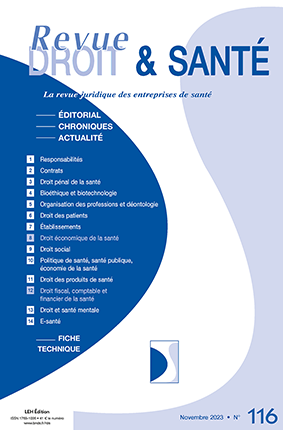Résumé : Dans le cadre du dispositif d’expérimentation de l’article 51 de la loi de financement de la Sécurité sociale (LFSS) pour 2018, l’expérimentation « ÉQUILIBRES » est une approche centrée sur le patient. Avec l’utilisation du référentiel standardisé « Omaha », l’équipe établit un plan de soin et en assure le suivi. Elle procède à des évaluations périodiques du patient, vues de façon globale/holistique. Les professionnels s’engagent à exercer en équipe solidaire (quatre personnes minimum). Ils reçoivent une formation et un accompagnement spécifique pour la bonne santé de leur vie d’équipe. Basée sur le temps passé auprès du patient, la rémunération est calculée sur un taux horaire uniforme de 53,94 euros recouvrant toute intervention infirmière conforme au décret de compétences (article R. 4311-1 à 15 du CSP).
L’expérimentation « ÉQUILIBRES » remplit tous les critères pour être pérennisée :
• une source d’économie pour la Sécurité sociale, comme le demandait le cadre de l’expérimentation (aucune dépense complémentaire, donc, in fine, une limitation parfaite de l’inflation des dépenses de santé) ;
• la mise en place d’une exception au financement par le déploiement d’un forfait au temps passé auprès du patient ;
• un impact significatif sur la prise en charge des patients avec un taux de satisfaction des patients élevé, notamment en permettant aux soignants d’être plus présents auprès d’eux ;
• un impact positif sur les soignants avec un taux très élevé de satisfaction au travail et un retour « du sens au travail » ;
• un développement des compétences infirmières qui rentre parfaitement dans le cadre de la réingénierie du diplôme infirmier (soins relationnels, diagnostic, prévention, éducation thérapeutique, etc.) ;
• un impact significatif en intégrant une responsabilité populationnelle en utilisant des critères précis d’inclusion des patients à la prise en charge par le dispositif « ÉQUILIBRES » et pouvant donc s’ouvrir à tout un territoire donné ;
• le retour à une vision positive, constructive offrant une grande part à l’envie de réenchanter les métiers soignants par les initiatives du terrain.
En remplissant tous les critères posés par le cadre de l’expérimentation prévue à l’article 51 de la LFSS pour 2018, le dispositif « ÉQUILIBRES » devrait sans aucun doute être pérennisé. Toutefois, celui-ci va plus loin et donne raison au législateur en faisant bouger les lignes de la profession infirmière, qui est actuellement en crise, et ce, en visant un accès aux soins en accord avec le principe de la responsabilité populationnelle et en refaisant du temps passé auprès du patient un enjeu de notre
système de santé. Pérenniser le dispositif « ÉQUILIBRES », c’est à la fois acter la reconnaissance des professionnels, des patients, mais aussi reconnaître l’efficacité de la méthode par l’expérimentation d’une réforme en partant de l’écoute des professionnels.
Abstract: As part of the experimental system of article 51 of the Social Security Financing Act for 2018, the “ÉQUILIBRES” experiment is a patient-centered approach. Using the standardized “Omaha” framework, the team establishes a care plan and monitors it. It carries out periodic assessments of the patient, viewed in a global/holistic manner. Professionals undertake to work as a united team (four people minimum). They receive training and specific support to ensure the good health of their team
life. Based on the time spent with the patient, remuneration is calculated on a uniform hourly rate of 53,94 euros, covering any nursing intervention in accordance with the skills decree (article R. 4311-1 to 15 of the French Public Health Code).
The “ÉQUILIBRES” Experiment meets all the criteria to be sustainable:
• a source of savings for Social Security System, as required by the framework of the experiment (no additional expenditure, therefore, ultimately, a perfect limitation of the inflation of health expenditure);
• the establishment of an exception to financing by deploying a flat rate for the time spent with the patient;
• a significant impact on patient care with a high patient satisfaction rate, particularly by allowing caregivers to be more present with them;
• a positive impact on caregivers, with a very high rate of job satisfaction and a return to a “meaning of work”;
• a development of nursing skills which fits perfectly into the framework of the re-engineering of the nursing diploma (relational care, diagnosis, prevention, therapeutic education, etc.);
• a significant impact by integrating a population responsibility by providing precise criteria for the inclusion of patients in the care of the “ÉQUILIBRES” system, and can therefore be opened up to an entire given territory;
• a return to a positive, constructive vision, giving a large part to the desire to re-enchant the healthcare professions through field initiatives.
By meeting all the criteria set out in the experimental framework provided for in article 51 of the Social Security Financing Act for 2018, the “ÉQUILIBRES” scheme should undoubtedly be perpetuated. However, it goes further than this, proving the legislator right by changing the face of the nursing profession, which is currently in crisis, by aiming for access to care in line with the principle of population responsibility and by making time spent with patients a key issue in our healthcare system. Making the “ÉQUILIBRES” system permanent means not only acknowledging the recognition of professionals and patients, but also recognising the effectiveness of the method by experimenting with a reform based on listening to professionals.
Mots-clés : infirmier – expérimentation – financement
Keywords: nurse – experimentation – funding





